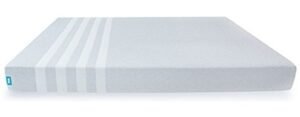
Thick mattresses are not only comfy and luxurious, but they are also known to offer the best night’s sleep. That’s the reason why everyone secretly desires a luxurious thick mattress for their bedroom. Mattress Thickness Guide: How should I choose the best?
However, sleeping on a too thick mattress may also lead to bad sleep that further affects your health. The mattress thickness is even referred to as its depth or height. If a mattress is more than 16 inches thick, it’s considered to be extra tall or extra deep.
Not only comfort but the thickness of your mattress also affects your bed’s overall height. To be precise, the mattress top should be 25 inches thick from the floor to help you easily reach the floor when you’re on the seated position at the bed’s edge. This way, it’s convenient for you to get in or out of the bedding. But the thickness of the mattress depends on one’s preference and requirements.
Factors Affecting Mattress Thickness Preferences-
Different factors affect the preference of users when it comes to choosing the right thickness. Some of these factors are as follows:
Body Weight-
Unlike the air mattress for hospital beds, you need to consider your and your partner’s body weight when choosing the right mattress for your bedroom.
For instance:
If partners weight 225 pounds or less, they can comfortably sleep on a mattress of 9-inch thickness.
Partners weighing somewhere between 225 to 275 pounds can comfortably sleep on a 10-inch thick mattress.
And, if partners weigh more than 275 pounds or more, they must consider a mattress of 12 inches or more for maximum comfort and support.
You may even consider adding a plush comfort layer on your mattress to enjoy a good night’s sleep.
Medical or Health Conditions-
If you have certain medical conditions, you might look for firmer or plusher mattresses, as recommended by your physician. For example, if you suffer from back pain, a firm mattress with a few layers is perfect for you.
But if you suffer from conditions like arthritis, shoulder pain, fibromyalgia, and hip pain, you might prefer thicker mattresses with comforting layers that provide softness and some height to the mattress.
Even side sleepers prefer thicker and soft mattresses to alleviate certain pressure points on the shoulder and hip while lying on the side. The key is to select the right thickness to ensure maximum comfort while sleeping.
Mobility Issues-
Some people may have certain mobility concerns for which they need a thicker mattress to work with mobility aids. For instance, people who use mobility scooters or wheelchairs to move around may need to choose higher mattress thickness to easily transition back and forth without putting any strain on their backs, necks, arms, etc.
Total Bed Height-
Another important thing to consider is the total bed height when adding the mattress. A bed that is too tall can make it difficult for you to touch the feet on the floor while sitting on the edge of the bed. This way, it can be difficult to get in and out of the bed.
Besides a mattress, other things that affect bed height are the bed frame, foundations, box springs, and risers under the bed frame. Thankfully, the height of your bed can be adjusted by altering the riser height, foundation, bed frame, etc. You must select the mattress that works well with the overall height of your bed for comfortable height.
Conclusion-
Different people have different mattress thickness preferences, depending on their choice or any medical condition. So, you need to consider the given factors when determining the right thickness for your mattress.
